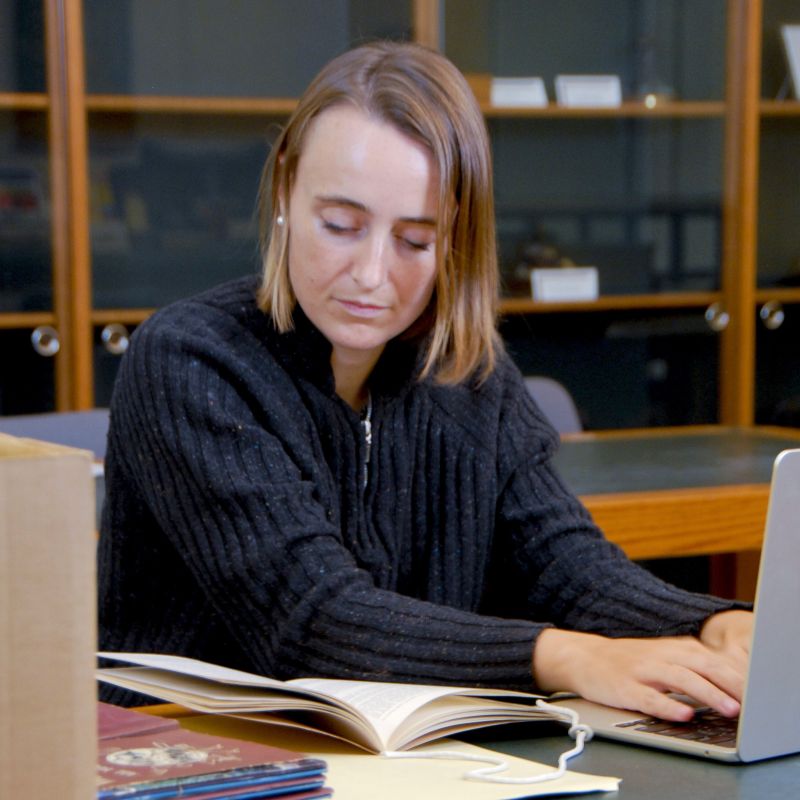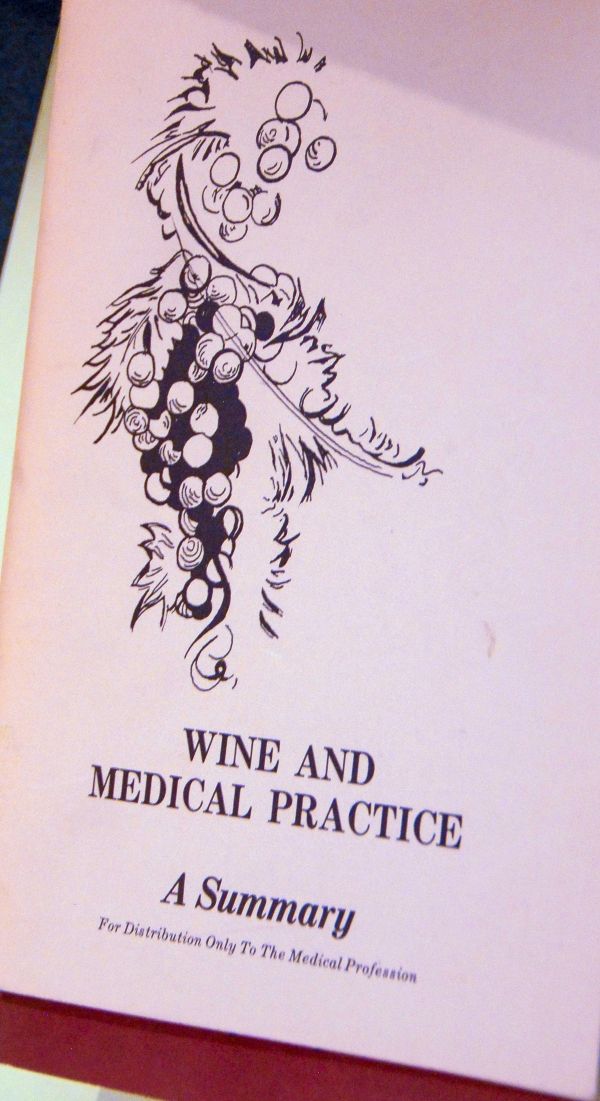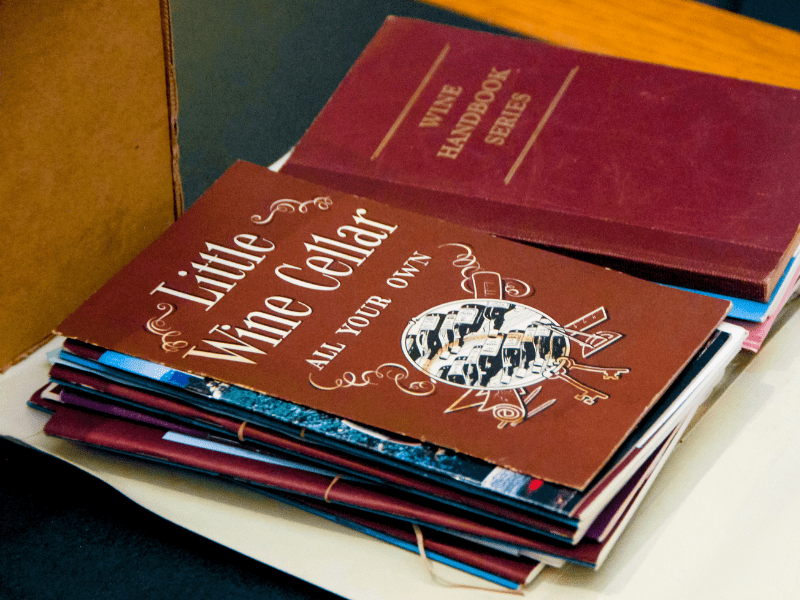Announcing the 2025-26 Spurrier-Winiarski Wine Writer-in-Residence Award
The $50,000 award’s first recipient, Meg Bernhard, recounts her time at the UC Davis Library’s Archives and Special Collections
Journalist, essayist and author Meg Bernhard, the inaugural recipient of the Spurrier-Winiarski Wine Writer-in-Residence Award, spent her three-month residency at UC Davis digging deep into the library’s wine archives to source material for her next project.
Centered around climate and wine, Bernhard’s work has appeared in The New York Times Magazine, The New Yorker, and the Los Angeles Times, among other notable publications. During her time at the library, Bernhard examined how climate change has affected winemaking both in the US and globally.
“I’ve been interested in climate change for most of my life, even if I didn’t have a name for it when I was a child,” said Bernhard. “The Southwest’s megadrought encompassed my childhood. I remember when I was a kid, in suburban Southern California, I used to see yard signs that read ‘brown is the new green.’”
Although Bernhard had already observed and reported on many of the ways that climate change has influenced our lives, she became interested in viticulture after moving to Spain to work in vineyards. It was there that she witnessed the impact of climate change on the wine industry firsthand.
“It became clear to me that viticulture was another world that climate change dramatically shaped,” Bernhard wrote. “I met winemakers who had lost part of their crop to extreme heat…I met winemakers who lost grapes to mildew when the spring and summer were hotter and rainier than normal. There were winemakers in France who lost their grapes to unseasonable frost and hail.”

Working with the UC Davis Library’s wine collections allowed Bernhard to put these changes in the wine industry into historical context and craft her forthcoming collection of essays, “Wine on Fire.”
She spent significant time with the diaries of George Belden Crane, one of Napa Valley’s earliest vineyardists. Through his writing, she learned about California’s Great Flood of 1862, a climate event reminiscent of the atmospheric rivers California has experienced in recent years.
“Reading his writing reminded me how much I love talking to farmers and grape growers, because they’re attentive to the weather and can track changes over years,” Bernhard said. “They’re the first in line to bear witness to climate change.”
The wine industry has faced extreme climates before
While at UC Davis, Bernhard also studied the papers of Leon Adams, an influential wine historian and founder of the Wine Institute. Adams’ research notes and correspondence revealed the extent to which American winemakers have been adapting to extreme climates for generations.
“I was fascinated to learn about the struggles of Minnesota’s winemakers in the ’60s and ’70s,” Bernhard said. “To protect their vines against freezing temperatures, in the winter they buried them in mulch and straw – and they do this today, too. I had no idea.”
Bernhard learned of the efforts of the University of Minnesota faculty who helped develop varieties more resistant to the cold, opening regions like the Great Lakes and New England to winemaking.
“Increasingly, as California, Oregon, and Washington get hotter, [the Northeast and Upper Midwest] are becoming the future of winemaking in America,” Bernhard observed.
The health debate continues

Through the papers by Adams and the late UC Davis Professor Emeritus of Viticulture and Enology Maynard Amerine, who was one of the world’s foremost authorities on winemaking in the mid-to-late 20th century, Bernhard was also able to explore how the perceived health benefits and drawbacks of wine drinking have changed — or not — over time.
“Reading about the mid-century ‘neo-prohibitionist’ movement was helpful to put today’s alcohol/health debate into context,” Bernhard wrote. “We’ve been having this same argument for decades, perhaps centuries, about what wine does to our bodies and our minds.”
Beyond the books
During her time as the library’s Wine Writer-in-Residence, Bernhard was also able to meet with industry professionals and academic experts, gaining on-the-ground insights that complemented her archival research.
“I’ve had wonderful, informal conversations with winemakers, former librarians, and a grocer over a few glasses of wine. I’ve gotten the chance to speak with researchers, watch a climate talk from [best-selling author and Davis resident] Kim Stanley Robinson, and attend a presentation on the brief re-emergence of Tulare Lake in the Central Valley.”
— Meg Bernhard, Spurrier-Winiarski Wine Writer-in-Residence
Bernhard took advantage of the campus’s proximity to the vineyards and wineries of Northern California to conduct interviews with farmers who have witnessed the effects of climate change for themselves. One agriculture industry worker she met in the Santa Cruz area had lost his home to wildfire. In Yolo County, she met winemakers who harvest at night and plant drought-resistant grape varieties to try to combat the worst effects of extreme heat.
Bernhard also hosted a workshop on sensory writing for students in partnership with the library and UC Davis’ Department of Viticulture and Enology.
Apply for the 2025-26 Spurrier-Winiarski Wine Writer-in-Residence Award
Bernhard’s research was supported by the library’s Spurrier-Winiarski Wine Writer-in-Residence Award. This $50,000 award supports a three-month residency at UC Davis to write and publish a long-term project through research in the library’s special collections.

The residency is for wine writers looking to add their voices to the canon of wine writing — cultivating a new generation of perspectives on wine. The 2025-26 application cycle is now open. Emerging, mid-career, or established writers from academia, journalism, and/or traditional or non-traditional writing outlets are invited to apply.
Archives available include the library’s Wine Writer Collections, which contain the papers of many of the most important wine writers of the 20th and 21st centuries. Both the Spurrier-Winiarski Wine Writer-in-Residence Award and the library’s expansive wine writer collections were made possible by generous gifts from the late Napa winemaker, grape grower and philanthropist Warren Winiarksi. Throughout his life, Winiarski was passionate about the importance of wine writing in shaping the industry. Through the library’s wine writer collections — and the work of emerging wine writers, like Bernhard, who find inspiration in them — Winiarski’s legacy lives on.
Related
- Meg Bernhard Named 2024 Spurrier-Winiarski Wine Writer-in-Residence at UC Davis
- Remembering Legendary Napa Winemaker Warren Winiarski
- Remembering Steven Spurrier and the 1976 Judgment of Paris Tasting
- World-renowned Vintner Gives $3.3 Million to UC Davis Library
- Spotlight: The Power of the Written Word
- UC Davis Library Food and Wine Collections